Who Are the Monsters of Beowulf?
How monsters highlight Beowulf's mortality in the face of adversity and the gray area between his heroism and the monsters' corruption
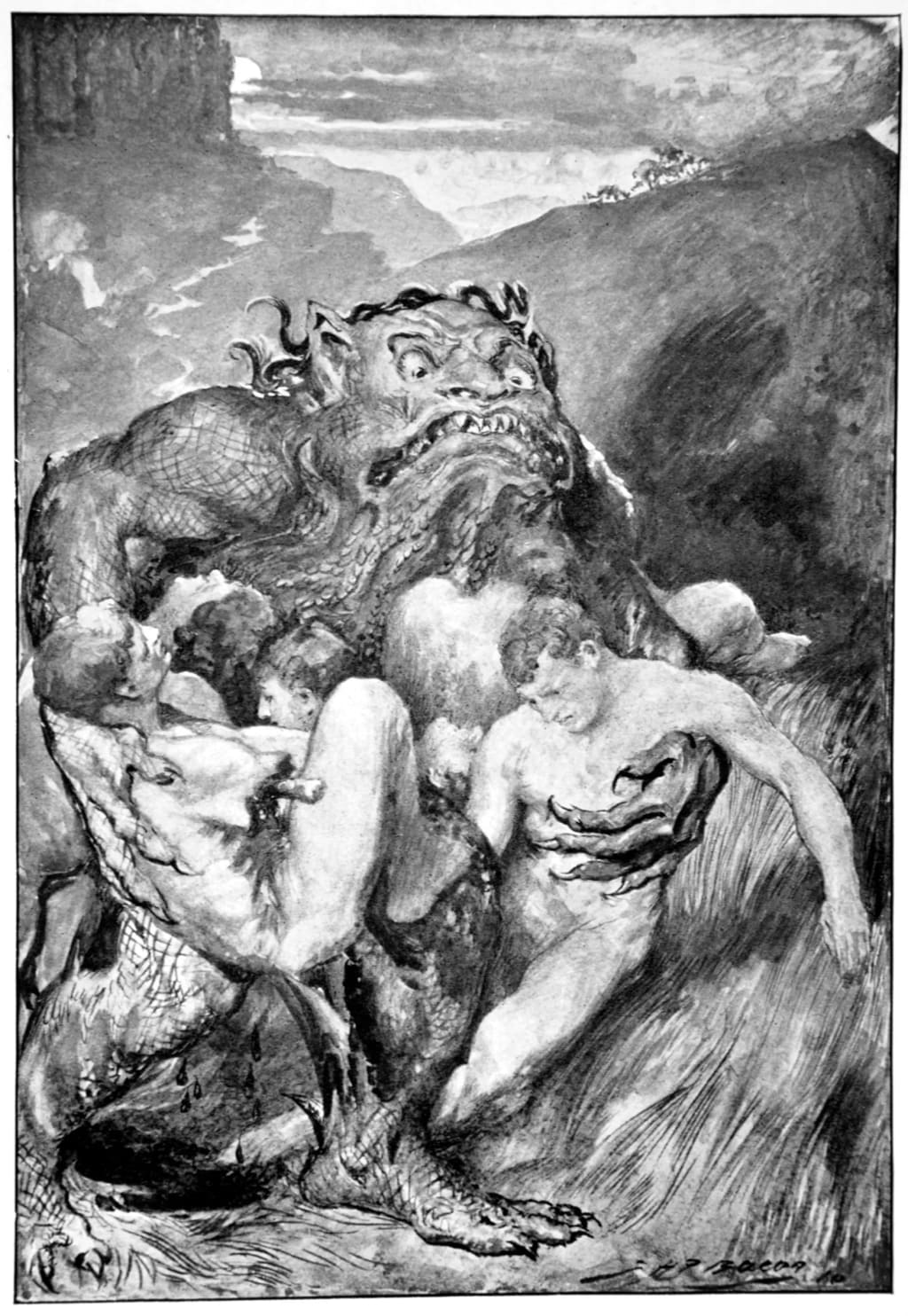
The Epic of Beowulf
Beowulf is an Old English epic poem written by an anonymous Anglo-Saxon poet in England sometime between the 8th and 11th centuries. It tells the story of the Geat hero Beowulf who aids the king of Danes Hrothgar in exterminating Grendel, a monster plaguing the great hall Heorot. Beowulf slays Grendel by ripping off his arm. When Grendel's mother finds out that her son was slain she kills Hrothgar’s closest advisor as revenge. In response, Beowulf travels to her lair and slays her, bringing back Grendel’s head as a trophy. Beowulf is rewarded greatly for his efforts and returns home to Gautland, eventually becoming its king.
Later in his life, a dragon is terrorizing his realm after a piece of its treasure hoard was stolen. Beowulf decides to fight the dragon with the help of his servants, but every servant draws back save for one: his young Swedish relative Wiglaf. They follow the dragon to its lair where they manage to slay it at the cost of Beowulf’s life. As he is drawing his last breath, Beowulf's final wish is to die looking at the treasure he attained from slaying the dragon.
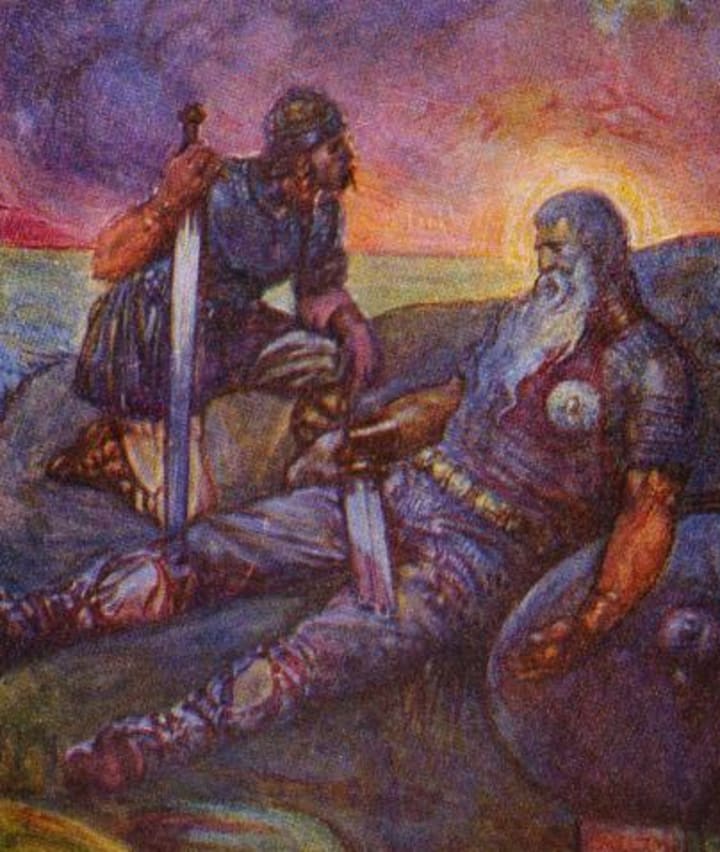
The Role of Monsters in Beowulf
Beowulf has been criticized for placing the “unimportant” events of Beowulf’s battle against the monsters to the forefront while the “important” historical background and legends are kept on the sidelines. However, J.R.R. Tolkien argues in his essay: “Beowulf: The Monsters and the Critics'', that the role of the monsters are to highlight Beowulf’s heroism as a mortal being put to the test against overwhelming adversity through his battles against them. In the same vein, the poem can be seen as an elegy where the first two monsters serve to highlight young Beowulf’s glory while the dragon highlights old Beowulf’s heroism in saving his kingdom. Relatedly, Victoria Symons presents a separate view that the monsters serve to act as the physical manifestations of Beowulf's twisted nature due to the shared corrupt qualities with the monsters he slays. Both authors show that the monsters play a large, if not one of the most significant roles in the epic of Beowulf to illustrate the mortality of man against adversity as well as to highlight the corrupt qualities Beowulf and the monsters both possess as he gains glory and riches.
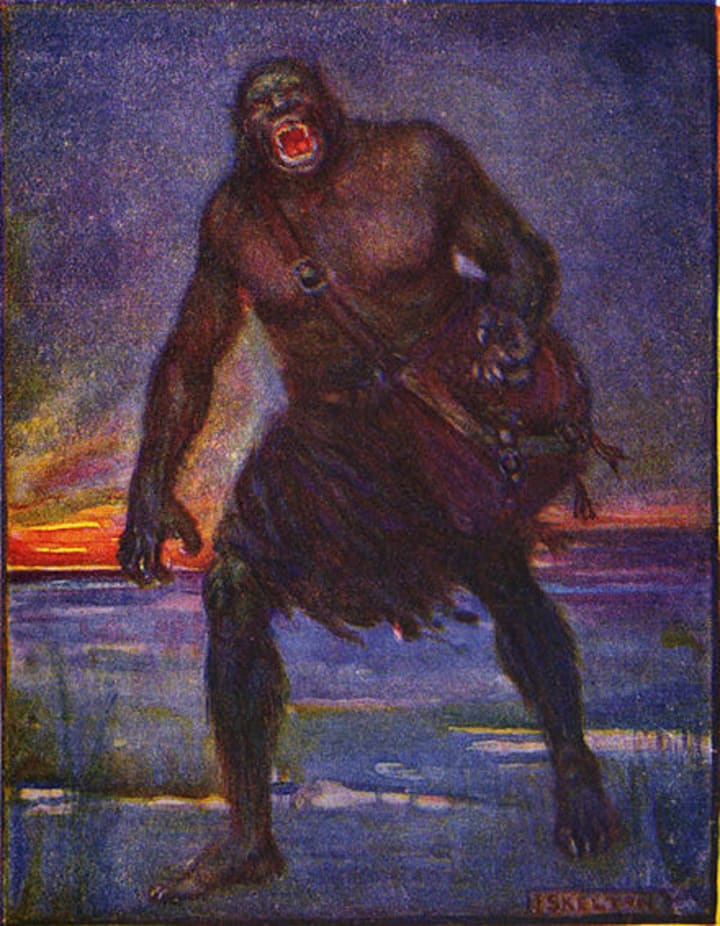
The Mortality of Man Against Overwhelming Adversity
Tolkien’s essay argues against the criticism that monsters serve little role in the epic. Especially the criticism by W. P. Ker, when he states: “a disproportion that puts the irrelevancies in the centre and the serious things on the outer edges” (qtd. in Tolkien 9). Ker claims that the monsters have little role other than to serve as adversaries to Beowulf while the crucial historical background is kept on the sidelines. To this, Tolkien clarifies the role of the monsters in Beowulf: “Man alien in a hostile world, engaged in a struggle which he cannot win while the world lasts, is assured that his foes are the foes also of Dryhten, that his courage noble in itself is also the highest loyalty” (Tolkien 27). Beowulf may be a powerful hero, but he is still a mortal being in a world where he is fated to die, either through battling monsters or old age. The fact that the monsters are enemies of Dryhten which means God, highlights Beowulf’s heroism because he defeats God's enemies.
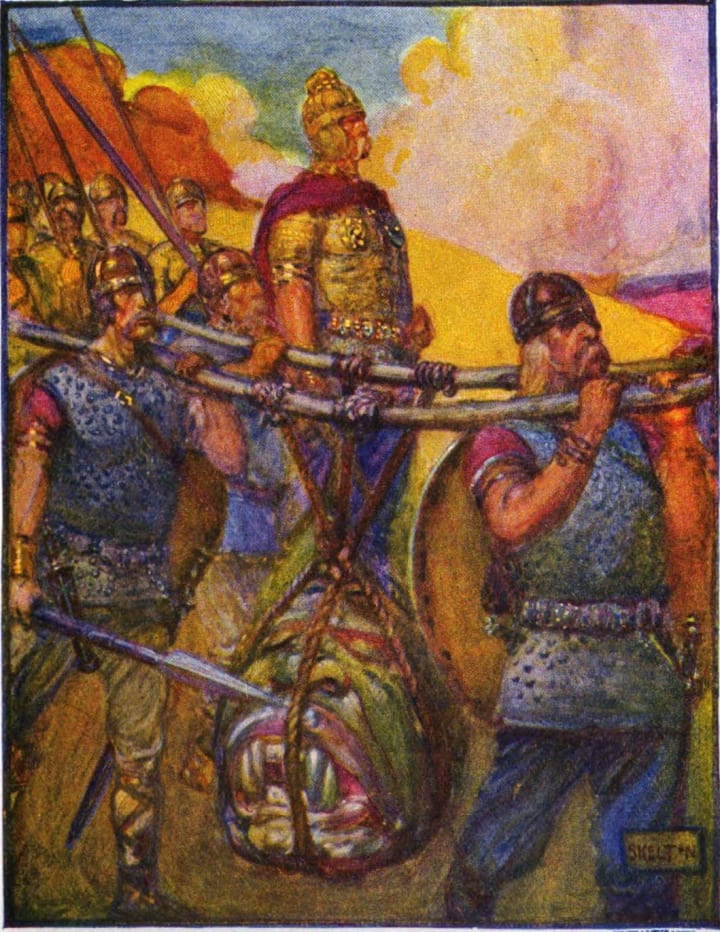
To this extent, The epic can be seen as an elegy for Beowulf, as he gains glory in his early years and sacrifices his life in his older years to slay the dragon terrorizing his kingdom. For example, Tolkien states: “No terms borrowed from Greek or other literatures exactly fit: there is no reason why they should. Though if we must have a term, we should choose rather 'elegy'. It is an heroic-elegiac poem; and in a sense all its first 3,136 lines are the prelude to a dirge” (Tolkien 33). Grendel acted as an opportunity for Beowulf to gain glory when he offered to slay the monster. However, the dragon was an unavoidable battle for Beowulf because he had to save his kingdom. It is fitting that Beowulf falls to a dragon, a mythical beast that is the embodiment of legend and power, highlighting the mortality of man no matter how glorious the hero.
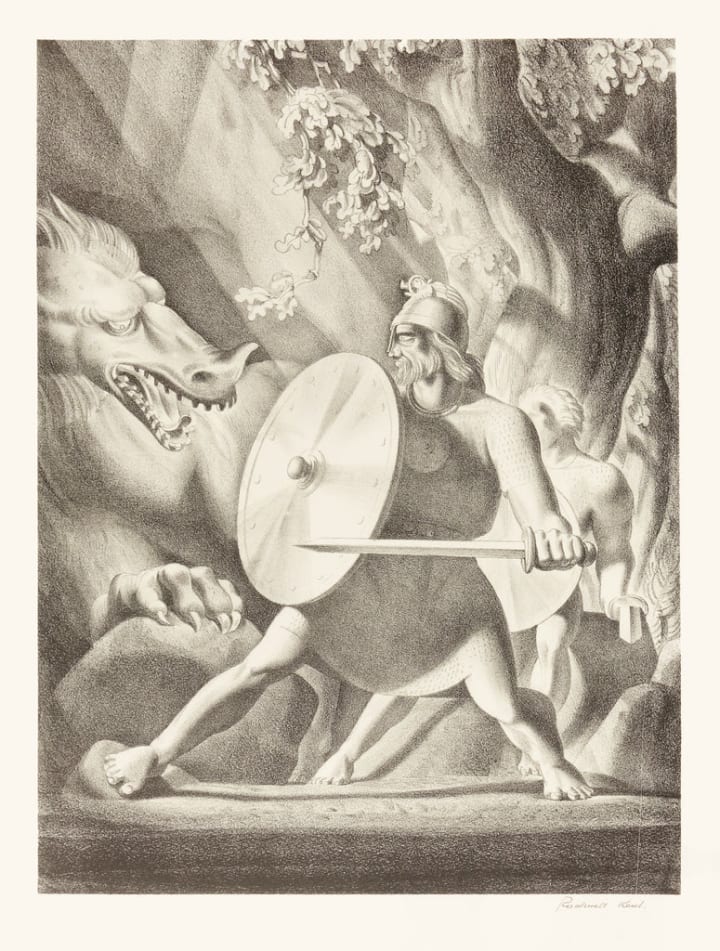
How Beowulf Blurs the Line Between Heroism and Corruption
In the article written by Victoria Symons: “Monsters and heroes in Beowulf”, she presents a separate role for the monsters: as the physical manifestations of Beowulf’s corrupt nature. For example, Grendel is perceived as an outcast stemming from the fact that he is the descendant of Cain who was cast out for fratricide and doomed to wander the world in exile (qtd. in Symons). Similarly, Beowulf was an outsider before he slew Grendel. He came from afar without notice to offer to slay the monster. Beowulf was raised by his uncle because his father was cast out of his tribe while Grendel was raised by a single mother. Grendel and Beowulf are both characters who have experience being the outsider. As outcasts, their fates were tied to each other leading up to their fierce battle.
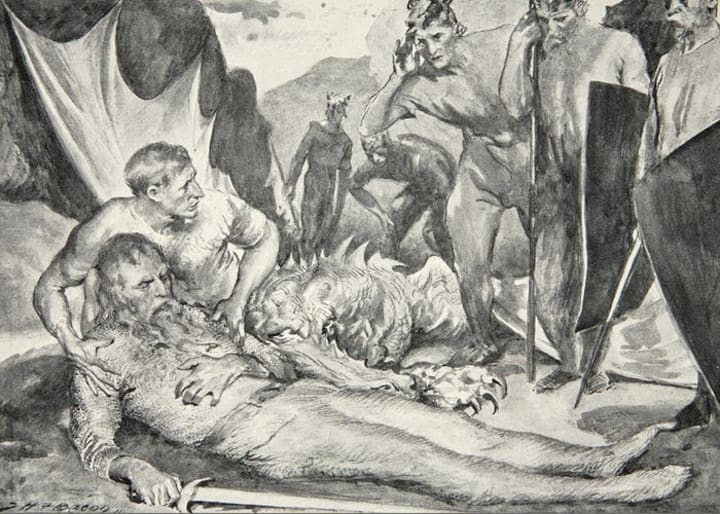
Near the end of Beowulf’s life, he rules as king over Gautland until a dragon starts terrorizing his realm. After Beowulf sacrifices his life to slay the dragon, his final wish is to die looking at his newly acquired treasure. The dragon was wreaking havoc due to a piece of its treasure being stolen. This overwhelming greed caused its death after Beowulf and Wiglaf had to slay it to stop its rampage. Similar to the dragon, Beowulf coveted glory and riches through the opportunity of slaying Grendel and later his mother. Hrothgar celebrated his achievements and rewarded him generously before he returned home to Gautland where he was exalted as a hero. Even in his twilight years, Beowulf embraces his glory and riches as his final wish was to die reveling in his newfound wealth and glory of having slain a dragon which embodies legend and renown. The monsters represent physical manifestations of Beowulf’s twisted qualities as an isolated and avaricious character illustrating that the distinction between the heroism of Beowulf and the corruptness of the monsters are not so black and white.

The Legacy of Beowulf
J.R.R. Tolkien’s stance on Beowulf is that the monsters serve to highlight human mortality in the face of overwhelming adversity. Relatedly, Victoria Symon's stance is that the monsters act as physical manifestations of Beowulf's twisted qualities as he chases glory and riches through slaying monsters, indicating the gray area between Beowulf's heroism and the monsters' corruption . Ultimately, Beowulf is praised as a product of its time where its motifs of mortality, heroism and corruption continue to make its mark on the literary world.

Thank you for reading my analysis on Beowulf. I wrote this paper in one of my college classes and decided to post it on my blog because my professor said good things about it (Thanks Professor H!). I polished it up a little for you guys so read it at your leisure. Did you agree with some of my points? Disagree? Let me know in the comments!
Works Cited:
Tolkien, J.R.R. “Beowulf: The Monsters and the Critics.” Beowulf-Tolkien essay. 1983.
Symons, Victoria. “Monsters and Heroes in Beowulf.” British Library, 2018, www.bl.uk/medieval-literature/articles/monsters-and-heroes-in-beowulf.
About the Creator
Tommy Yuen
A budding writer who loves fitness, martial arts, movies, books, shows and more!






Comments
There are no comments for this story
Be the first to respond and start the conversation.